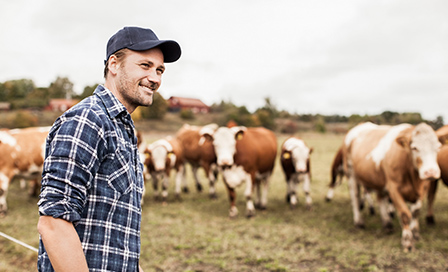Webinar Series: A Mother's Game Plan for Safety and Health
This series is designed to create a place for women in agriculture to understand the risks, needed protection and supervision for tasks performed by youth on farms. This project is designed to shift the mindset and behavior of parents and grandparents, leading to safer and healthier lives for our farm youth and those who visit and work on farms. While the target of this work will be women who serve as family influencers, the materials will be suitable for all adult family members. The groundwork for this project was laid by the development of the Agricultural Youth Work Guidelines (AYWG) and by the US Child Agricultural Safety and Health Think Tank.
Funding for these projects was provided by the National Institute for Occupational Safety and
Health via the National Children’s Center for Rural and Agricultural Health and Safety.
Grant # U54OH00968-12.
Project Goals
Work to create a safety mindset, developing a safety-first culture in the home setting and around the farm. Outcomes will include the following:
- Developing safety and healthy habits early in life, thereby influencing the rest of their lives.
- Improving knowledge, attitudes, and beliefs towards risk of childhood injury and illness.
- Creating a healthier and safer environment for youth and for the farming operation as a whole.
- Reducing acute and chronic issues related to agriculture across central Illinois.
View/Listen to the webinars:
- Carle Rural Health Webinar Series: ATV & UTV Safety, Webinar 1
- Carle Rural Health Webinar Series: Grain Handling, Webinar 2
- Carle Rural Health Webinar Series: Technology Advancements in Ag, Webinar 3
- Carle Rural Health Webinar Series: Healthy Youth in Ag, Webinar 4
- Carle Rural Health Webinar Series: Tractor Operations, Webinar 5
- Carle Rural Health Webinar Series: Working with Livestock, Webinar 6
- Carle Rural Health Webinar Series: Mental Health, Webinar 7
Podcast Series: A Mother's Game Plan for Safety and Health
Welcome to a podcast series brought to you by Carle Health through funding of from the National Children's Center for Rural and Agricultural Health and Safety Emerging Issues Program. Funding for these projects was provided by the National Institute for Occupational Safety and Health via the National Children’s Center for Rural and Agricultural Health and Safety. Grant # U54OH00968-12.
Every episode on our podcast addresses a new topic important to your health and safety, bringing in experts in respective fields of rural health to discover risks and offer advice and answer your most pressing questions.
Listen to the podcasts:
ATV Safety
Working with Livestock - Animal Behavior, Feeding, & Cleaning
Overall Health for Youth Employed in Ag
Youth Working on Farms & Women as Influencers in Safety and Health
Grain Handling
Technological Advancements and Dangers in Ag
Mental Health in Agriculture
Tractor Operations for Youth
Mental Health First Aid
Would you know what to do if you saw someone having a panic attack or were worried a friend or co-worker might be showing signs of alcoholism? Carle and our Rural Alliance partners are making Mental Health First Aid (MHFA) classes available to the communities we serve, to help take the stigma out of speaking up and guiding those in need to potentially life-saving help.MHFA, a national program taught by local instructors, is an interactive, eight-hour certification course.
Learn how to identify and understand signs of mental illnesses and substance use disorders.
Gain skills to respond and provide initial help and support to someone who may be experiencing a crisis or developing a mental health problem.
Please note this is for the adult course only; we do not provide youth MHFA training at this time.
Register Here
Managing Stressful Situations
Stress
Stress is normal especially for farmers who deal with unpredictable weather and markets. However, unmanaged stress can cause serious issues including physical symptoms. Signs of stress to look out for include headaches, muscle tension, upset stomach, rapid heartbeat, fatigue, difficulty falling or staying asleep, lack of concentration or focus, irritability or anxiety among others.
It is important to identify the source of your stress and recognize the warning signs because everyone responds to stress differently. Find healthy ways to manage stress such as exercising, or talking with friends or family. Also make sure to take care of yourself by eating right, staying hydrated with water and getting enough sleep. Mental health is just as vital as physical safety in the farming profession. Talk. Ask. Listen.
Depression
Some signs of depression include trouble concentrating, remembering details and making decisions, fatigue, feelings of guilt and hopelessness, insomnia, irritability and loss of interest in pleasurable activities.
Carle Center for Rural Health knows farmers are tough and self-reliant but talking about emotions or pressures can be challenging. If you or someone you know is in crisis, call the National Suicide Hotline at 1-800-273-TALK / (800) 273-8255 or dial 911. Farmers extend a great deal of energy caring for their land, livestock, machinery and family. As good as agricultural producers are in caring for others, they are not always as careful in taking care of themselves. Mental health is just as vital as physical safety in the farming profession. Talk. Ask. Listen.
Calling upon the farming community – friends, neighbors or clergy makes a difference in managing stressful situations and crisis. Resources are available. Contacts the National Suicide Hotline at (800) 273-TALK or dial 911. Visit AgriSafe Network for information on acess to mental health resources.
Another resource is The Iowa Concern hotline. This line is open to ANYONE (not just Iowans) and offers help with financial, legal, stress, and crisis problems. They are well versed in agriculture and rural issues. Call (800) 447-1985 for assistance.
